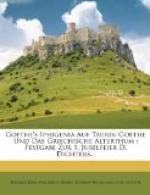Thoas.
Bear they their own guilt, or their ancestors’?
Iphigenia.
The Titan’s mighty breast and nervous frame
Was his descendant’s certain heritage;
But round their brow Jove forg’d a band of brass.
Wisdom and patience, prudence and restraint,
He from their gloomy, fearful eye conceal’d;
In them each passion grew to savage rage,
And headlong rush’d uncheck’d. The Titan’s son,
The strong-will’d Pelops, won his beauteous bride,
Hippodamia, child of OEnomaus,
Through treachery and murder; she ere long
Bore him two children, Atreus and Thyestes;
With envy they beheld the growing love
Their father cherish’d for a first-born son
Sprung from another union. Bound by hate,
In secret they contrive their brother’s death.
The sire, the crime imputing to his wife,
With savage fury claim’d from her his child,
And she in terror did destroy herself—
Thoas.
Thou’rt silent? Pause not in thy narrative!
Do not repent thy confidence—say on!
Iphigenia.
How blest is he who his progenitors
With pride remembers, to the list’ner tells
The story of their greatness, of their deeds,
And, silently rejoicing, sees himself
Link’d to this goodly chain! For the same stock
Bears not the monster and the demigod:
A line, or good or evil, ushers in
The glory or the terror of the world.—
After the death of Pelops, his two sons
Rul’d o’er the city with divided sway.
But such an union could not long endure.
His brother’s honour first Thyestes wounds.
In vengeance Atreus drove him from the realm.
Thyestes, planning horrors, long before
Had stealthily procur’d his brother’s son,
Whom he in secret nurtur’d as his own.
Revenge and fury in his breast he pour’d,
Then to the royal city sent him forth,
That in his uncle he might slay his sire,
The meditated murder was disclos’d,
And by the king most cruelly aveng’d,
Who slaughter’d, as he thought, his brother’s son.
Too late he learn’d whose dying tortures met
His drunken gaze; and seeking to assuage
The insatiate vengeance that possess’d his soul,
He plann’d a deed unheard of. He assum’d
A friendly tone, seem’d reconcil’d, appeas’d.
And lur’d his brother, with his children twain,
Back to his kingdom; these he seiz’d and slew;
Then plac’d the loathsome and abhorrent food
At his first meal before the unconscious sire.
And when Thyestes had his hunger still’d
With his own flesh, a sadness seiz’d his soul;
He for his children ask’d,—their steps, their voice,
Fancied he heard already at the door;
And Atreus, grinning with malicious joy,
Threw in the members of the slaughter’d boys.—
Shudd’ring, O king, thou dost avert thy face:
So did the sun his radiant visage hide,
And swerve his chariot from the eternal path.
These, monarch, are thy priestess’ ancestors,
And many a dreadful fate of mortal doom,
And many a deed of the bewilder’d brain,
Dark night doth cover with her sable wing,
Or shroud in gloomy twilight.




